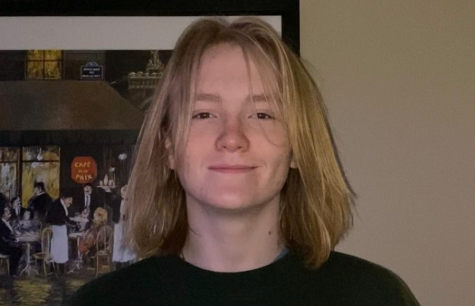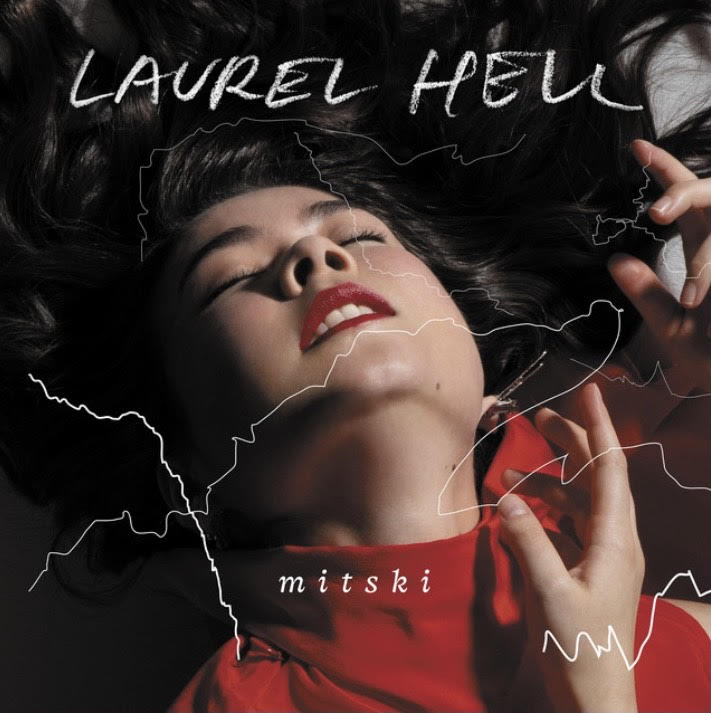Mitski’s Laurel Hell stumbles into mediocrity
Indie darling releases most lack-luster album to date
Mitski is a Japanese-American singer/songwriter, that at this point should need no introduction.
With her constant critical acclaim throughout the 2010s, and the undying droves of fans of Gen-Z Mitski fans that lurk in all corners of the internet, as well as hit singles like “Nobody,” she is without a doubt one of the biggest indie darlings of the last decade.
I’ve done my share of buying into the Mitski hype too, with Puberty 2 and Be The Cowboy both being pretty stellar indie/art rock and pop fusions.
Intimate, heartbreaking lyrics about growing up, breaking up and other, usually sad, pastiche.
Mitski’s discography isn’t perfect, at all, there isn’t an album of hers that isn’t deeply flawed in some way.
These flaws ironically don’t really take away from the experience of the record, as the musical talent was never the focus of Mitski’s work.
While her vocals are technically impressive, especially in her upper range, Mitski’s raw, emotional and earth-shatteringly personal performances remain her strongest pull.
Some of Mitski’s best songs are somewhat generic piano ballads, with an indie twist and passionate vocal delivery.
All this to say, I really enjoy Mitski’s work. I think she has one of the most unique voices, and is generally a pretty solid songwriter, but Laurel Hell kind of bored me.
The first single released in the lead up to Laurel Hell was “Working For the Knife,” which is honestly one of Mitski’s worst songs.
The clangy, ugly trip-hop style production, dissonant pianos and random interjections of hazy guitars make this song feel like a glimpse into Fiona Apple’s fever dreams.
The second look at this record, “Heat Lightning,” was much better. A sparkling, reflective dream pop ballad with a steady tempo and captivating chorus.
The subtle guitar embellishments, descriptive lyrics, stuttering drum loop and lavish string details, all mixed with an dreamy chamber pop atmosphere make this possibly my favorite song on the record.
“The Only Heartbreaker,” was the next single, and another one of my favorites. Ear-worm chorus, warm synth beds, punchy new wave production and a super satisfying climax that perfectly compliments Mitski’s impassioned, retro vocal performance.
The lyrics here are devastating, and the beat is danceable, in classic Mitski fashion.
The most danceable song on the record, “Love Me More” was the last single released before Laurel Hell.
I don’t enjoy this one quite as much, but the supremely nostalgic chorus and throbbing synths are complimented by a sweetly produced vocal performance.
Mitski really flexes her talents at recreating synthpop and new wave sounds, with great accuracy on the vocal and synthesizer front, but this track is missing something in the songwriting department to have me coming back.
While the chorus is euphoric, the mix and song structure leave something to be desired, especially in the drum and bass lines.
With the singles ranging from terrible to amazing, I was not sure at all what to expect from Mitski this time around.
I knew it was going to be nostalgic and synth based, as is the trend both the industry and Mistki’s music are headed in, but I was hoping for more than the simple synthpop worship that was evident on most of the singles.
Unfortunately, that’s not really what Mitski delivered.
Most of the tracks here follow the same trend that causes me so much frustration, that is having a few amazing ideas and backing them up with nothing.
I want to appreciate the moments here that are so amazing, but they are constantly counteracted with either tedious or downright ugly choices Mitski repeatedly makes.
“There’s Nothing Left For You” is perplexing, as its first half is taken up by a repetitive, drony, pad synth and deadpan vocal delivery.
The switch up here is intense, with sharp, Midwest emo-tinged guitars piercing through the mix, as Mitski boldly wails over the walls of distortion.
The drums here mixed perfectly, which is somewhat rare on Mitski releases, but this climax is ruined by a sudden and jarring return to the A section.
She packs all of this into less than three minutes, and more development could have made this track an extremely bold and dynamic moment, but instead it’s a messy and unsatisfying one.
Mitski shows love for post-punk bands like The Smiths on “Should’ve Been Me,” and while its interesting to see Mitski dive into this style so holistically, its frustrating to see her offer no new spin on it whatsoever.
The quirky, danceable keys and pulsing bassline serve as a solid backdrop to Mitski’s heartbroken poetry, but it really does sound like a dead ringer for female Morissey.
“I Guess” is a watery, warm piece of melodramatic chamber and dream-pop, deeply reminiscent of Beach House and Weyes Blood.
Mitski’s vocals here are mixed very strangely, and it does work for the song, with her voice even clipping at some points.
While this song does offer a pleasant listen while its on, nothing necessarily draws me back to this particular track.
This song feels equal parts Drugdealer and The Mamas and Papas, and is still disappointing.
The closing track “That’s Our Lamp” starts with an ugly synthesizer and Mitski duet. While Mistki’s poetry is, as usual, deeply interesting, the song here is literally unbearable for the first half.
Mitski then adds a cowbell and bassline to the second verse, making this uniquely confusing.
Mitski somehow makes this three minute long song feel extremely long, and not in a good or interesting way.
I do enjoy the climax of this song though, with its screeching organs, colorful percussion and bellowing Mitski performance, all culminating into an almost Talking Heads-esque atmosphere.
This track is still disappointing, but the ending is one of my favorite moments on this record.
The songs at the beginning of the record are generally of higher quality, with the opening track “Valentine, Texas” being one of my favorites.
The stark, cinematic introduction to this song, with a weepy and heavily delayed and reverbed vocal performance, that suddenly transcends into a lavish piece of avant-garde chamber pop.
Descriptive, beautiful poetry, harmonious key playing and rich beds of strings suddenly engulf the entire mix, creating one of the most blissful atmospheres on the record.
“Stay Soft” was another moment I found to be a highlight, with its fuzzy bass lines and sparkling, sexy atmosphere.
The chorus here is probably the catchiest on the record, and the progression on the song is also probably the most successful structurally.
This song is a perfect showcase of Mitski’s talents at writing simultaneously catchy and enveloping songs.
Laurel Hell is not amazing, and it really bums me out to say that.
I often found myself frustrated at the clear creativity, but lack of follow through all over this record.
So many moments were purely stunning, but surrounded by moments that were either dull or just straight up ugly.
I wanted to let myself buy into this record, as a new Mitski release should always be cause for celebration, but aside from some key outstanding tracks, I don’t think I’ll find myself revisiting Laurel Hell too often.
SCORE: 5/10
Best tracks: “Heat Lighting”, “The Only Heartbreaker”, “Valentine, TX”.
Worst tracks: “Working For The Knife”

Senior Desmond Fitzgerald is a entertainment editor on The A-Blast. At school, he participates in chorus, swim and lacrosse. In his free time, he loves...




